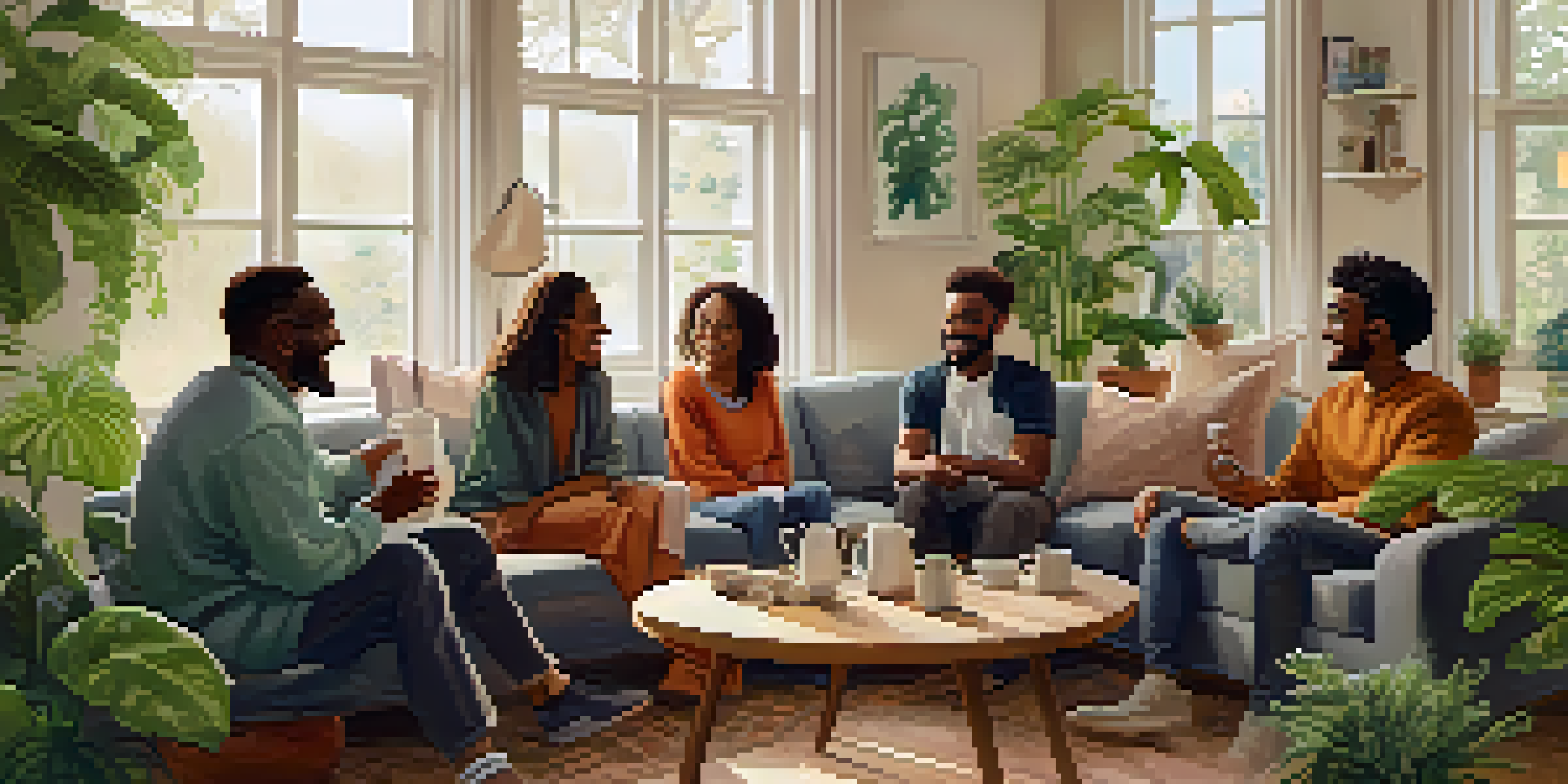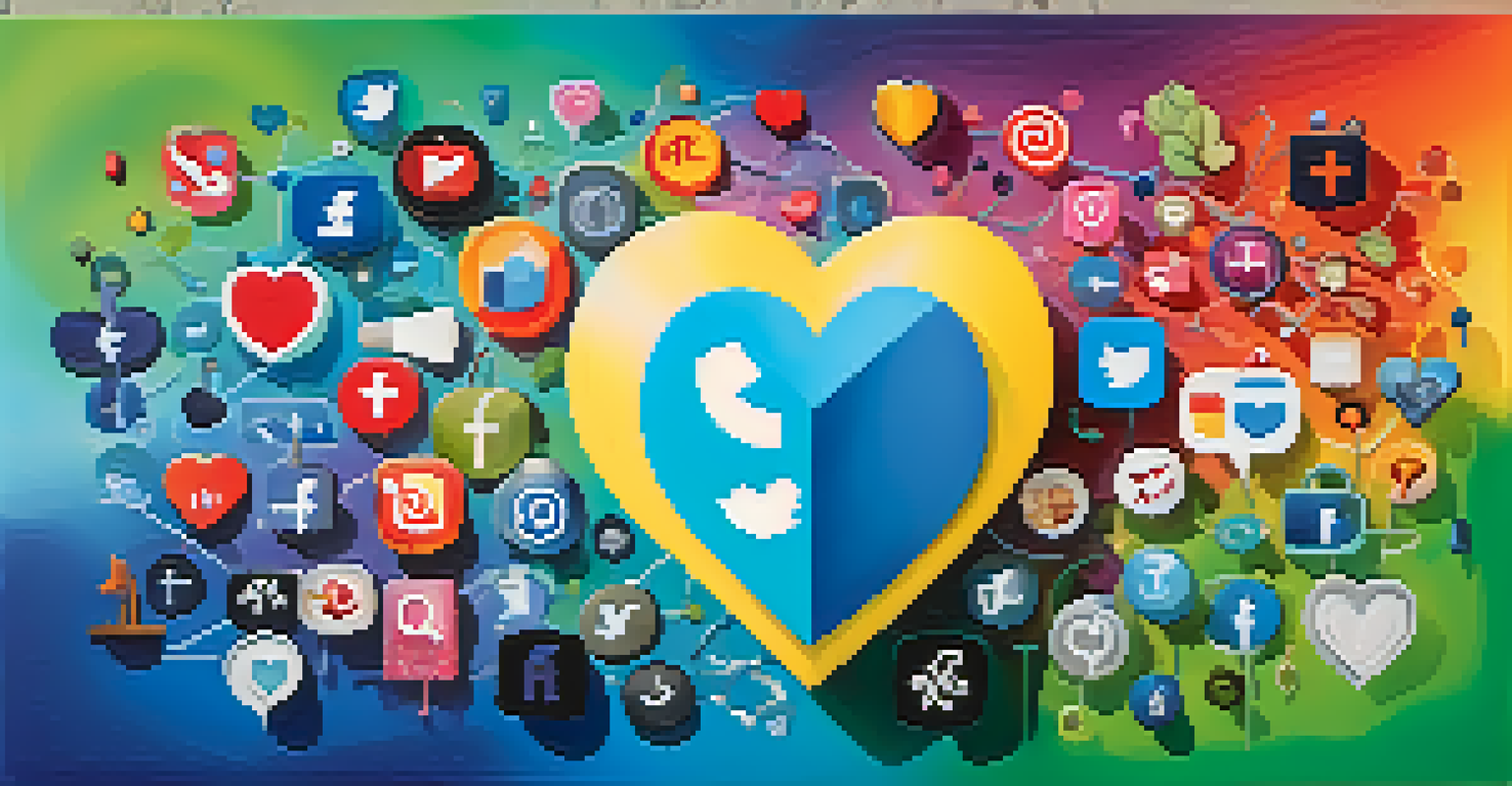Social Media's Role in Community Mental Health Initiatives

Understanding the Intersection of Social Media and Mental Health
In today's digital age, social media platforms have become vital for connecting communities. They serve as a space where individuals can share experiences, seek support, and find resources related to mental health. This connection can help break down the stigma often associated with mental health issues, making it easier for people to open up.
Social media is not just a tool for communication; it is a platform for community and connection, especially for those struggling with mental health.
For example, a Facebook group dedicated to mental health awareness can foster a sense of belonging among participants. Here, they can discuss their struggles and triumphs, creating a supportive environment. This online camaraderie can be a lifeline for individuals feeling isolated in their mental health journeys.
Moreover, social media can amplify messages from mental health professionals, spreading awareness about available services and educational materials. These platforms can help bridge gaps in traditional mental health outreach, especially in underserved communities.
Building Awareness Through Online Campaigns
Social media campaigns have proven effective in raising awareness about mental health issues. Initiatives like #MentalHealthAwarenessMonth encourage users to share their stories and resources, creating a ripple effect of understanding. This collective effort can educate the broader community about the importance of mental health.

Consider the success of campaigns promoting mental health days, where users are encouraged to take a break for self-care. These movements not only normalize the conversation around mental health but also empower individuals to prioritize their well-being. This outreach can lead to increased participation in community mental health programs.
Social Media Connects Mental Health
Platforms like Facebook and Instagram create communities that support individuals in their mental health journeys.
As more people engage with these campaigns, they foster a culture of openness and dialogue. By making mental health a topic of discussion, social media helps dismantle barriers that prevent individuals from seeking help.
Creating Safe Spaces for Vulnerable Populations
Social media offers unique opportunities to create safe spaces for vulnerable populations. Groups focused on specific issues—such as LGBTQ+ mental health or anxiety support—allow individuals to connect with others who share similar experiences. This sense of belonging can significantly enhance their mental well-being.
The greatest gift you can give someone is your time and attention, and social media can help us connect when we feel isolated.
Platforms like Instagram and TikTok have become popular for sharing personal stories, where users can express their feelings and challenges. These platforms provide an avenue for creative expression, which can be therapeutic for many. In turn, this encourages others to share their experiences, further strengthening the community.
By cultivating these spaces, social media serves as a powerful tool for fostering resilience among marginalized groups. The visibility of these communities can lead to greater support from allies and advocates, creating a more inclusive dialogue around mental health.
Accessing Resources and Support Networks
One of the most significant advantages of social media is the ability to access mental health resources quickly. Users can find information about local support groups, hotlines, and therapy options with just a few clicks. This accessibility is crucial for those who may not know where to start in seeking help.
Additionally, many mental health organizations maintain active social media profiles, providing valuable content and updates. For example, followers can learn about workshops, webinars, and community events aimed at improving mental health. This consistent engagement helps keep mental health at the forefront of public consciousness.
Influencers Promote Mental Health
Influencers share personal stories to destigmatize mental health issues and encourage followers to seek help.
Through social media, individuals can also connect with peers who are navigating similar challenges. These networks often offer emotional support, advice, and encouragement, making the journey toward mental wellness feel less daunting.
The Role of Influencers in Mental Health Awareness
Influencers have become powerful advocates for mental health on social media. By sharing their personal experiences, they can reach vast audiences and destigmatize mental health struggles. Their authenticity resonates with followers, inspiring others to seek help and talk about their own challenges.
For instance, when a popular influencer discusses their mental health journey, it can validate the feelings of their audience. Followers may feel less alone in their struggles, prompting them to engage with mental health resources. This ripple effect can lead to increased awareness and understanding across diverse demographics.
Moreover, influencers often collaborate with mental health organizations, amplifying important messages and initiatives. This partnership helps bridge the gap between personal experience and professional resources, encouraging a community-driven approach to mental health.
Potential Risks and Challenges of Social Media
While social media has many benefits for mental health initiatives, it also comes with risks. The prevalence of misinformation can lead to confusion about mental health conditions and treatments. This highlights the importance of sharing accurate content and promoting reliable resources.
Moreover, social media can sometimes exacerbate mental health issues, particularly for individuals prone to comparison or negative self-image. The curated lives often showcased online can create unrealistic expectations, leading to feelings of inadequacy. It's crucial for users to be mindful of their social media consumption and its impact on their mental health.
Risks of Social Media Use
While beneficial, social media can spread misinformation and negatively impact self-esteem for some users.
To mitigate these risks, fostering digital literacy is essential. Encouraging users to critically evaluate the content they encounter can empower them to engage more positively with social media.
Future Trends in Social Media and Mental Health
As we look to the future, the role of social media in mental health will likely continue to evolve. Increased integration of mental health resources within social media platforms can enhance accessibility. For example, features that allow users to connect directly with mental health professionals through messaging could become more common.
Additionally, we may see a rise in virtual support groups and therapy sessions conducted via social media platforms. This trend could make mental health support even more accessible, particularly for those in remote areas or with mobility challenges. The potential for anonymity online also encourages participation from individuals who may feel uncomfortable in traditional settings.

Overall, the future of social media and mental health initiatives holds great promise. By harnessing technology and fostering community connections, we can pave the way for improved mental health outcomes for all.